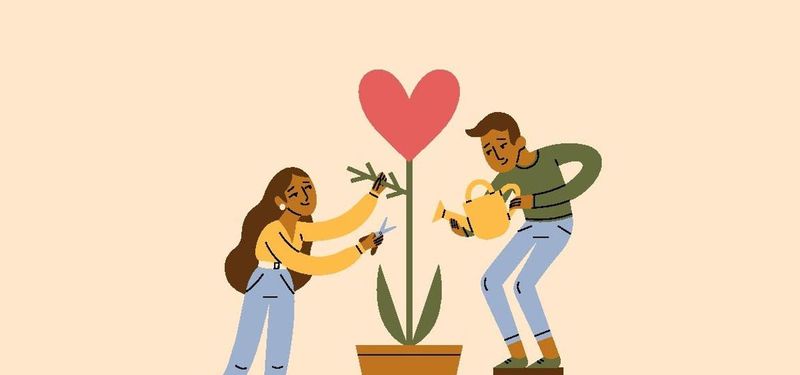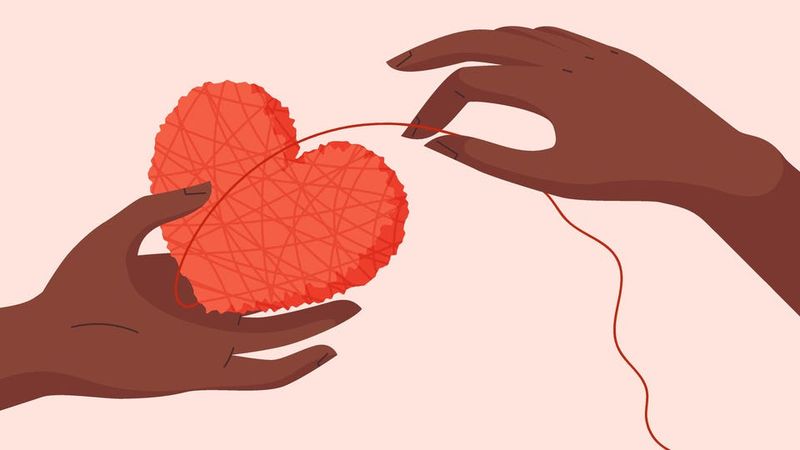Nobody really tells you the gritty, strange, sometimes achingly ordinary truths about long-term love.
We grew up on movie endings and the first kiss, but not the awkward pauses, the silent breakfasts, or the times you question everything at 2AM. Psychologists see what’s behind the curtain—and it’s not always what we wish it was, but it’s always real.
Here’s what nobody says out loud, but every couple faces if they’re in it for the long haul.
1. Love Changes Shape—And That’s Not Failure
Remember when you couldn’t keep your hands off each other? That phase fades, no matter how hard you wish it would stick around. Love doesn’t stay in one shape—sometimes it’s a spark, sometimes it’s a slow burn, and sometimes it’s just warmth on a cold day.
You think losing that high means something is broken. Turns out, it’s normal. Psychologists say the honeymoon hormones wear off in a few years, and what’s left is up to you to grow.
You’re not broken if you stop feeling butterflies. You just moved from infatuation to the real deal. The passion can return, but it won’t look like the movies—it’ll look like shared jokes, midnight drives, and the safety of showing the messiest parts of yourself. That’s what actually lasts.
2. You’ll Fight About Stupid Things, And That Matters
One night it’s the toothpaste cap. Next week, it’s how someone loads the dishwasher. The little things can turn volcanic, and it’ll make you question your sanity.
But here’s what therapists see: The small fights are never about the dishes. They’re about feeling heard, respected, and safe. When you stop fighting, that’s when you should worry—not when you’re bickering about socks.
The point isn’t to never argue. The point is to figure out why those things matter so much. Sometimes, the fight is just a stand-in for something deeper. And when you realize that, you can actually find your way back to each other, even if the dishwasher never changes.
3. Compatibility Isn’t Destiny—It’s a Skill
You know those quizzes promising to find your perfect match based on favorite movies or foods? Total nonsense. Long-term love isn’t about matching playlists. It’s about how you handle being mismatched.
Real compatibility, psychologists say, is learned—not found. It’s about learning how the other person feels about feelings, how they handle stress, and how you navigate that together.
Two people with totally different interests can still make it if they learn to be curious about each other’s inner world. That takes work, courage, and a willingness to let go of the fantasy that love should be easy if you’re with the right person.
4. You’ll Need To Forgive—A Lot
Forgiveness isn’t a one-time act—it’s a daily practice. You’ll hurt each other, sometimes on purpose, sometimes by accident, and other times because you just weren’t paying attention.
Therapists say couples who last are the ones who can let things go. Not because the hurt didn’t matter, but because holding on poisons everything else.
Forgiving doesn’t mean forgetting or letting someone off the hook. It just means choosing to keep showing up, allowing both you and your partner to be human—messy, complicated, and worth loving anyway.
5. Personal Space Isn’t a Threat
She needed to leave the apartment for a few hours alone, and you thought it meant she didn’t love you anymore. Well, as it turns out, she just needed to breathe. Nobody can be everything for anybody, and that’s not a flaw.
Psychologists are clear: Personal space is oxygen for a relationship. It lets you remember who you are outside of the couple. The healthiest love stories make room for solitude.
When you let each other step away, you both return with new stories, new energy, and sometimes, a little more desire. The real threat isn’t space—it’s suffocation.
6. Vulnerability Is a Power Move
Most of us were taught to protect ourselves—keep the walls up, stay strong. But long-term love is built on the moments when you put the armor down. Telling the truth about your fears or failures is how intimacy grows.
A good psychologist will tell you: Vulnerability isn’t weakness. It’s the bravest thing you can do together.
Every time you risk being seen, you invite your partner to do the same. That’s the stuff connection is made of. Even if it’s awkward, even if you ugly-cry, it’s worth it. That’s how you build a love that lasts.
7. Respect Is the Real Bedrock—Not Passion
The movies don’t talk about respect much, but every therapist I’ve ever met says it’s the secret ingredient. You can have fireworks passion for a while, but it won’t save you from contempt or dismissiveness.
Respect means listening when you feel like rolling your eyes. It means letting your partner change and still rooting for them. It’s everyday manners, even when you’re mad.
Long-term love gets boring without passion, sure. But it doesn’t survive at all without respect. That’s just the truth nobody puts in the wedding vows.
8. You Can’t Coast—Love Needs Maintenance
There’s no autopilot in relationships, even though every part of you wants that. Maintenance is less sexy than grand gestures, but it’s what keeps the roof from leaking.
It’s called “active love”—checking in, doing the boring chores, making time for date night even when you’d rather watch TV alone. It’s not glamorous, but it’s real.
When you don’t tend to the relationship, weeds start to grow. It’s easier to fix a leaky pipe before the basement floods, you know? Same goes for love.
9. Imperfection Is Where Love Lives
He always leaves his socks everywhere. She can’t remember where she put her keys. These little annoyances used to make me crazy. Now? They’re almost endearing.
It’s the imperfections that turn a relationship into a story. Nobody is lovable all the time. But loving someone anyway—that’s the whole point.
Don’t let Instagram fool you. Real love is full of quirks, bad hair days, and inside jokes about things only you two understand. That’s the magic, even if it’s never perfect.
10. Sexual Desire Isn’t Linear—And That’s Normal
There are months when sex feels like a chore, and others when it’s all you can think about. That ebb and flow is more normal than most people admit.
Therapists say sexual desire shifts with stress, health, age, and even the seasons. It doesn’t mean anything’s broken—unless you stop talking about it.
What matters is staying honest, even when it’s awkward. Sometimes the best intimacy comes from a laugh, a hug, or sharing what you honestly need—no pressure, no shame, just truth.
11. Growing Together—and Apart
You know what’s wild? Sometimes your partner will outgrow the person you met. Sometimes you’ll outgrow them, too. It’s not a crisis; it’s just life.
Couples who last learn to update their love as they go. They let each other become new people, and occasionally, that means falling for each other again—after the changes.
It’s not about growing in the exact same direction. It’s about making space for each other’s growth, supporting dreams, and coming back together, over and over, as new versions of yourselves.
12. You’ll Question Everything—And That’s Okay
Nobody warns you about the nights when you wonder if you chose wrong or if it’s supposed to feel this way. These moments feel lonely, but they’re actually universal.
Therapists hear it all the time: Doubt is part of long-term love. It’s not a sign to leave, unless it’s chronic and miserable. Usually, it’s just your brain making sense of change.
The real danger is pretending doubt doesn’t exist. Bring it into the light, talk about it, and you’ll probably find you’re not alone after all.
13. Routine Is Inevitable—And Can Be Beautiful
You’ll wake up and live the same day more times than you can count. At first, I hated the repetition. But there’s a certain beauty in the familiar, once you stop fighting it.
Psychologists say routines can be comforting, anchoring you when everything else feels unpredictable.
The trick is to find small ways to make the ordinary feel special—a new recipe, a shared playlist, a morning kiss. It’s not about escaping the routine. It’s about finding joy inside it.
14. Money Will Test You—Over And Over
Nobody likes talking about money, but nothing exposes your differences faster. Who spends, who saves, who hides receipts—these little things can blow up if you don’t face them together.
Money fights are the top reason couples split. It’s not about the dollars; it’s about trust, security, and old stories from childhood.
The couples who make it aren’t the ones who never argue about money. They’re the ones brave enough to keep having the conversation, even when it’s uncomfortable.
15. You’ll Miss Your Old Self Sometimes
It’s weird to grieve the person you were before the relationship. You’ll miss your independence, your single routines, or just the feeling of possibility.
Psychologists call this “identity loss,” and it’s completely normal. Long-term love changes you, sometimes in ways you didn’t expect.
Missing your old self doesn’t mean you regret your partner. It just means you’re human, piecing together past and present. The key is to talk about it, maybe even mourn it, and then find ways to keep a little bit of that old you alive.
16. Sometimes, Love Is a Choice—Not a Feeling
Some days loving your partner feels effortless. Other days, it’s more like a decision—a stubborn, quiet commitment to stay, even when you don’t feel much of anything.
Therapists say this is the real work of long-term love. Feelings come and go, but your choices shape what lasts.
It’s not romantic, but it’s solid. Some days you wake up and choose love, not because it’s easy or thrilling, but because you promised. And that’s enough.
17. Outside Support Is Not Just For Crisis
Most people think therapy or support is for when things fall apart. But couples who last use outside help before the walls close in. Talking to friends, mentors, or therapists isn’t weakness—it’s wisdom.
Psychologists wish more couples would ask for help early. Sometimes you just need someone neutral to help you hear each other again.
Support isn’t a sign of failure. It’s a sign you care enough to stay curious, brave, and honest—together.
18. You’ll See Parts Of Yourself You Don’t Like
Long-term love is a mirror, and it doesn’t always flatter. You’ll see yourself being petty, selfish, or insecure in ways you didn’t expect. It can be hard to admit, but it’s how you grow.
Therapists say your partner will trigger old wounds and reveal blind spots. That’s uncomfortable, sure—but it’s also an invitation to get real with yourself.
Facing your flaws together can be the most healing part of love, if you let it. The trick is to be honest, take responsibility, and stay kind—to yourself and your partner.



















